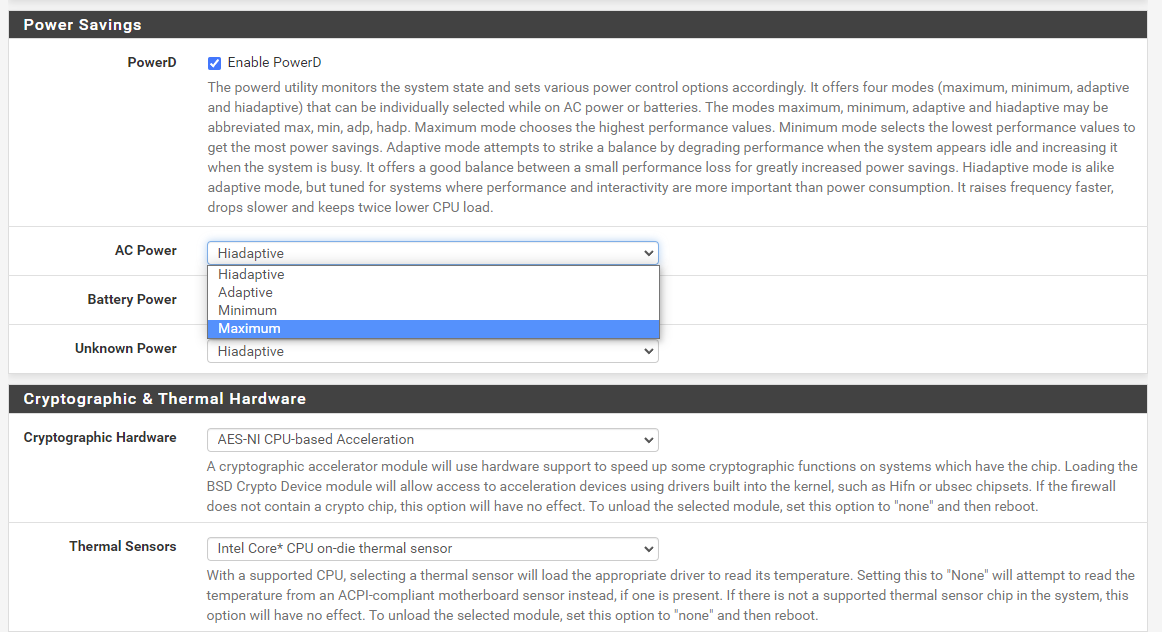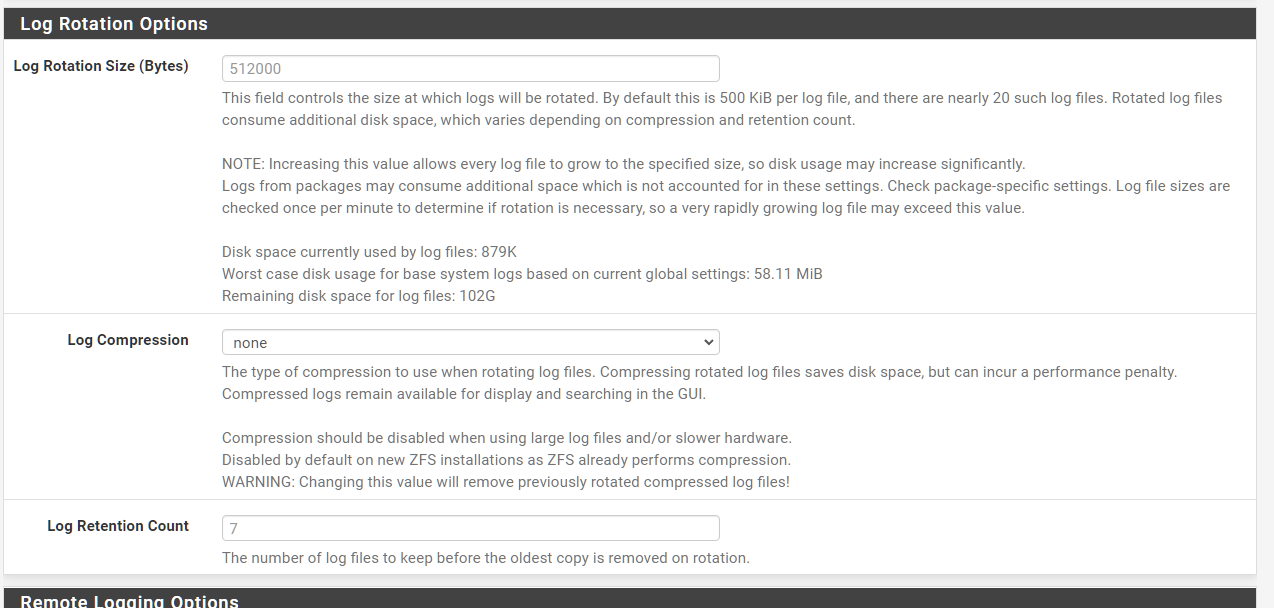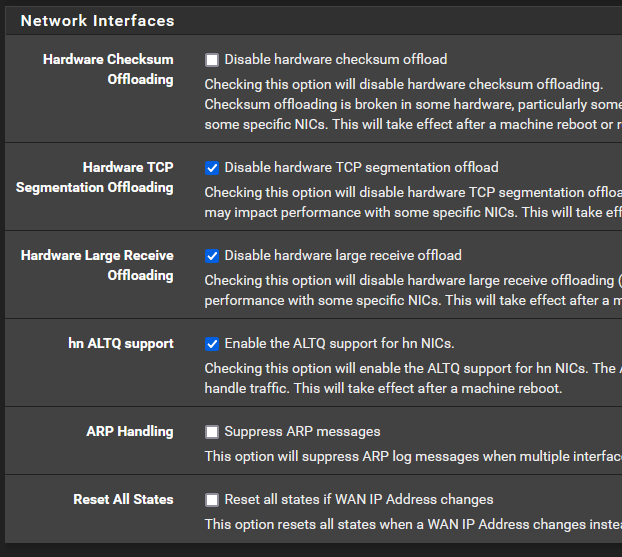-
@gerard64 might as well experiment a bit... Assuming the new drivers installed correctly, what happens if you step up processor performance settings to the max? Still have lost packets?
-
@rk0 How do i do that?
-
@gerard64 said in realtek-re-kmod missing in pfSense 2.6 repository?:
I wanted to install the stress command as @w0w suggested (thank you for that btw) but don't have any luck with installing it.
Try
/usr/local/bin/stress --cpu 4 --vm-bytes 3G -
@w0w Oke that works

CPU is at 100%, temperature stable at 52°C.
Network works stable, full line speed.
pfSense 2.5.2
With:
if_re_load="YES" if_re_name="/boot/modules/if_re.ko"Without:
hw.re.msi_disable=1 hw.re.msix_disable=1 hw.re.eee_enable=0 hw.re.phy_power_saving=0 hw.re.phy_mdix_mode=0This runs now for 30 minutes and i keep it running for another hour then i have to leave the house. But it seems to be pretty stable for this short while.
-
System has been running for a tad less than a full day right now with 2.6.0 and the newest Realtek drivers with zero packet errors, zero dropped packets. All looks good.
@gerard64 under System > Advanced> Miscellaneous you should see choices for power settings, which have an impact on the CPU. While you are at it, I'd spot check all your BIOS settings...while the following should not have an impact on a Realtek adapter and dropped packets, the "new" going forward settings for 2.6.0 should be having the BIOS in pure UEFI mode (not Auto), ZFS File system, Secure Boot disabled. I also decided to leave CSM enabled. Spot check your BIOS power management settings (separate from PFSense), and make sure they are set to allow you to utilize the full performance of your system. I'd just go through them all while you have the system down, see if there is anything else. I tend to turn off anything in BIOS that PfSense won't be using, just "because"...(example, PXE is off for the NIC adapters).
Set all the power settings...AC Power, Battery Power (even though your system is AC Powered), and Unknown Power to Maximum, and see how it does for a while. Also, my setting on the Thermal Sensors is because I have an Intel Processor...since yours is AMD, you should change that.

-
@gerard64
You're welcome!
Found some BIOS update for your HP
Source: https://www.reddit.com/r/PFSENSE/comments/rs7mn6/hp_t730_bios/Is it the one you have already installed? Some L43_0115.bin I think the file name is the BIOS version.
-
@w0w W0w that is really nice of you to think of that. At the moment I have very little time my wife is in the hospital since yesterday so my time is very limited at the moment. I hope things are more calm again next week then i will pick this back up and check it out and let you know.
I am really thankful for all your help
-
@rk0 Thank you a lot for all the information. I disabled all the com ports and parallel port. I also disabled WOL and PXE. But with PXE disabled pfSense hangs after 5 minutes. Now i enabled the PXE rom and seems pfSense doesn't hang anymore.
The IO ports and WOL were already disabled by me before. Now i tried to disable the PXE port as well but no luck with that one.
I have pfSense installed on UFS and BIOS not EUFI.
Wen i upgrade to pfsense 2.6.0 its is still on UFS in legacy biosShould i install pfsense 2.6.0 and recover from a saved config?
-
@gerard64 If you look at the 2.6.0 version upgrade, it says ZFS will be the default file system for PfSense going forward...and is also supposedly more forgiving if there is a sudden power outage. So, I figured change it now with the upgrade.
Weird that disabling PXE killed the adapters....and extra weird that it takes 5 min to hang...there are deeper problems with your system....
From https://docs.netgate.com/pfsense/en/latest/releases/22-01_2-6-0.html
*ZFS is now the default filesystem for new installations of pfSense Plus and pfSense CE software on all platforms which support booting from ZFS.
It is not possible to change from UFS to ZFS in place, a reinstallation of pfSense Plus or CE is required to migrate from UFS use ZFS.
The ZFS pool name and datasets have also been updated and optimized. Users who were already using ZFS may want to reinstall as well to ensure they have the most optimal disk layout.
pfSense Plus software has a new ZFS dashboard widget to track the status of disks using ZFS.
Log Compression for rotation of System Logs is now disabled by default for new ZFS installations as ZFS performs its own compression.*
-
@w0w i upgrade the bios from L43 1.00 (2015) to L43 1.15 (2019).
Tomorrow i am planning to try another upgrade to pfSense 2.6.0 with the help of the tips from @RK0 I will clean install and after that i'l use a saved config to recover my old configuration. Hopefully things work better from there. I'l let you guys know of course.
Thank you both a lot! -
@gerard64 If you import an old configuration file into a new install of 2.6.0 or higher, and the old file was from a system that did NOT use ZFS, and the new install WILL use ZFS, there is a recommendation to turn off log file compression under Status > System Logs > Settings

-
@rk0 for clarity, do you mean to turn off log compression before making the config backup, or a new 2.6.0 system should have log compression turned off before restoring a config?
-
Hello, i have problems too with my realtek nics, goes down with high use network, i install pfsense 2.6 version directly, i don't have old version in this new computer
Can try anything to better stability wan ??? -
R rcoleman-netgate referenced this topic on
-
R rcoleman-netgate referenced this topic on
-
@jon8rfc said in realtek-re-kmod missing in pfSense 2.6 repository?:
do you mean to turn off log compression before making the config backup, or a new 2.6.0 system should have log compression turned off before restoring a config
It's not related to the config backup or restore, other than making sure it's off when done. See the release notes:
"Log Compression for rotation of System Logs is now disabled by default for new ZFS installations as ZFS performs its own compression.
Tip
The best practice is to disable Log Compression for rotation of System Logs manually for not only existing ZFS installations, but also for any system with slower CPUs. This setting can be changed under Status > System Logs on the Settings tab." -
@rk0 thank you. In a earlier link from you to the pfSense manual I read about the log compression. I switched compression off. Today i was planning to do the upgrade to 2.6.0 but to little time today. So hopefully tomorrow. I hope the bios upgrade fixed the problems.
-
@gerard64 I must admit, if the BIOS upgrade changes the system behavior, that is wonderful...(but really that one thing would be a stretch concerning reliability of Realtek NIC cards....). I'm concerned there may be some "other" more subtle problem. Having the BIOS current is a good best practice however, as for many systems AMD and Intel release processor microcode to system manufacturers that is effectively a processor update...and "applies" with a BIOS update. That started after Pentium Pro microprocessors in the '90's had a problem calculating certain mathematical issues (the Pentium FDIV bug), and Intel had a massive (and expensive) recall of physical processors...to avoid that in the future, some subsequent elements of processor microcode could be updated via a firmware flash.
-
@virusbcn Follow the directions outlined eariler in this post to SSH into PFSense after you install 2.6.0, install the Realtek driver package from freeBSD, and edit your loader.conf.local file with a text editor...I put some fairly detailed steps in this post as to what to do in this post string, leveraging the excellent information from @w0w. If those are unclear, you may need to enlist a friend with some Linux experience to make the changes to your PFSense system.
-
@jon8rfc, the post from @SteveITS is correct...I made that post because...
-
If you have an old system (pre 2.6.0) that did NOT use ZFS (like mine was), and take its backup XML config file, it is likely the setting for Log Compression is on.
-
Then you do a fresh install of 2.6.0, but this time with the drive formatted for ZFS, and then restore the backup from the older system that didn't use ZFS...you have likely turned log compression back on, as that WAS the old setting from your old system. It would have "copied over" the default from the fresh install, where (at first) Log compression was off with ZFS.
-
Thankfully, this is easy to fix, just check the setting, and make sure it is off on the fresh install after you restore your backup XML file. (then take another snapshot backup XML file from your new install, and save it somewhere.....)
-
-
@rk0 While none of what you say is incorrect in any way...it just isn't the end of the world if something has two compression rounds done on it. ZFS will compress...or it won't if something is already compressed. The setting was changed by default because it is relatively pointless, not because it breaks anything.
-
E Earthlingz referenced this topic on
-
E Earthlingz referenced this topic on
-
Yes, I can confirm that on two mini pcs with Realtek network cards, with a 1Gb/1Gb PPOE fibre connection, I have been able to confirm that on both with Pfsense 2.6 newly installed, the WAN network card would disconnect when network traffic was high for about a minute and reconnect, with the new drivers it works perfectly under any level of network card stress.
@rcoleman-netgate
*@RK0
*I then issued the commands to download the revised Realtek drivers from freebsdfetch -v https://pkg.freebsd.org/FreeBSD:12:amd64/latest/All/realtek-re-kmod-196.04.txz
pkg install -f -y realtek-re-kmod-196.04.txz
I then loaded nano...just because it is easier than vipkg install nano
I then created a /boot/loader.conf.local file with the entriesif_re_load="YES"
if_re_name="/boot/modules/if_re.ko"
...and then rebooted the system**Also, I have been able to confirm that no matter how PowerD is set, and with the default networking options disabled it works perfectly.

Thanks to all of you for improving this system every day
Copyright 2025 Rubicon Communications LLC (Netgate). All rights reserved.